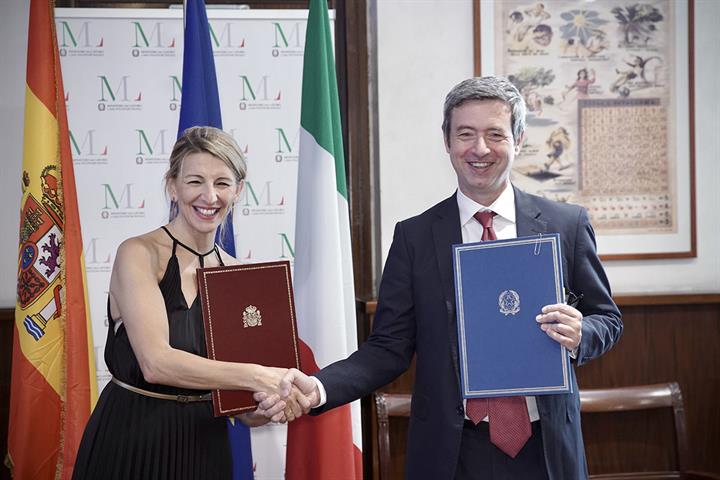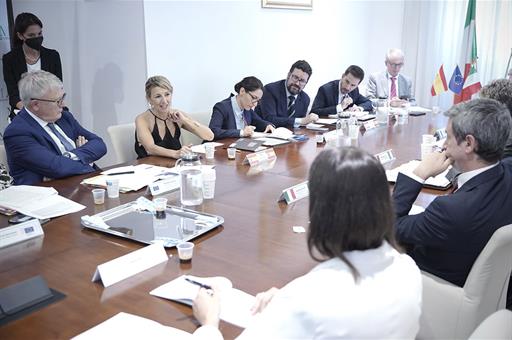Yolanda Díaz advocates more labour rights for digital platform workers across Europe
News - 2022.7.6
Workers' rights on platforms
Invited as the driving force behind the pioneering labour legislation in the field of delivery platforms, known as the "Rider Law", Díaz took part in Rome in the conference "Transnational Aspects of Platform Work", organised by the European Labour Authority (ELA) in collaboration with the Italian Ministry of Labour and Social Policies.
Díaz stressed that the shared governance of technology promoted by the Rider Act has succeeded in providing legal certainty by adapting labour law to the 21st century. It does so by shielding the labour character of work on distribution platforms and establishing a new right to algorithmic information for workers. "This confirms a universal right of representation, which applies to all types of companies, whether they are platforms or not", the minister emphasised.
Trilateral meeting
These key issues were also discussed at the trilateral meeting that Díaz held with his Italian counterpart, Andrea Orlando, and with the European Union (EU) Commissioner for Employment and Social Rights, Nicolas Schmit, with whom he analysed the proposal for a Directive on platform work presented by the European Commission.
It is a text, Díaz stressed, that is "up to the challenge: to set high standards of labour rights protection for digital platforms across Europe".
The vice-president argued that the Directive should be as ambitious as possible, that it should go further in guaranteeing transparency and protecting the presumption of employment, but also insisted that work should be done to ensure that workers do not bear the burden of proof of employment.
Díaz insisted on the need for technology to be at the service of people and of an algorithmic transparency that results in the common good, in labour policies that promote decent wages and real equality between people without neglecting the prevention of occupational hazards.
To this effect, he called for a new orientation of technological development to provide solutions to the most pressing social and environmental issues of our time, from the climate crisis to a just energy transition and the challenges of public health.
"It is our responsibility, as public authorities, to promote a model of an entrepreneurial state that innovates and places technological transformation at the service of workers", stressed the minister, who advocated digitalisation with rights, which conceives artificial intelligence as a public good, protects workers, extends labour rights and, in short, broadens democracy".
Strengthening Inspections
 Vice President Yolanda Díaz and Minister Andrea Orlando have signed a Declaration of Intent between the Labor Inspectorates of Spain and Italy.
Vice President Yolanda Díaz and Minister Andrea Orlando have signed a Declaration of Intent between the Labor Inspectorates of Spain and Italy.
The Minister for Work and her Italian counterpart also signed a Declaration of Intent between the Spanish and Italian Labour Inspectorates to strengthen bilateral cooperation in this area.
The aim of this declaration is not only to promote decent work, better protect workers' rights and favour free competition between companies, but also to increase bilateral cooperation in the fight against cross-border irregularities, including the possibility of developing coordinated investigations on companies whose legal headquarters, operating units, technological platforms or labour activities are developed or have some relevance in national territories.
The implementation and follow-up of the signed Declaration corresponds, on the Spanish side, to the State Labour and Social Security Inspectorate (OITSS), and on the Italian side, to the National Labour Inspectorate of the Republic of Italy.
Meeting with Visentini
The Vice-President of the Government of Spain also met with the Secretary General of the European Trade Union Confederation, Luca Visentini, with whom she discussed the recent approval by the European Union of the Directive on minimum wages, an initiative that has been strongly supported by the Government of Spain.
There were also discussions on platforms and a possible European social dialogue agreement on telework, digital disconnection and the general orientations of the Directive promoting the balanced presence of women on company boards, as well as on stepping up efforts to move towards a more social Europe.
New ILO Director
The vice-president also held a meeting with the next Director General of the International Labour Organisation (ILO), Gilbert Houngbo, who will take office on 1 October.
At the meeting, Díaz highlighted the high level of cooperation that currently exists between Spain and the ILO, as well as the efforts made to ratify the organisation's conventions. Spain has become the country that has ratified the most conventions globally.
For her part, the minister received Houngbo's support for the labour reform and the various measures that have been put in place to achieve structural changes in the Spanish labour market.
Non official translation





